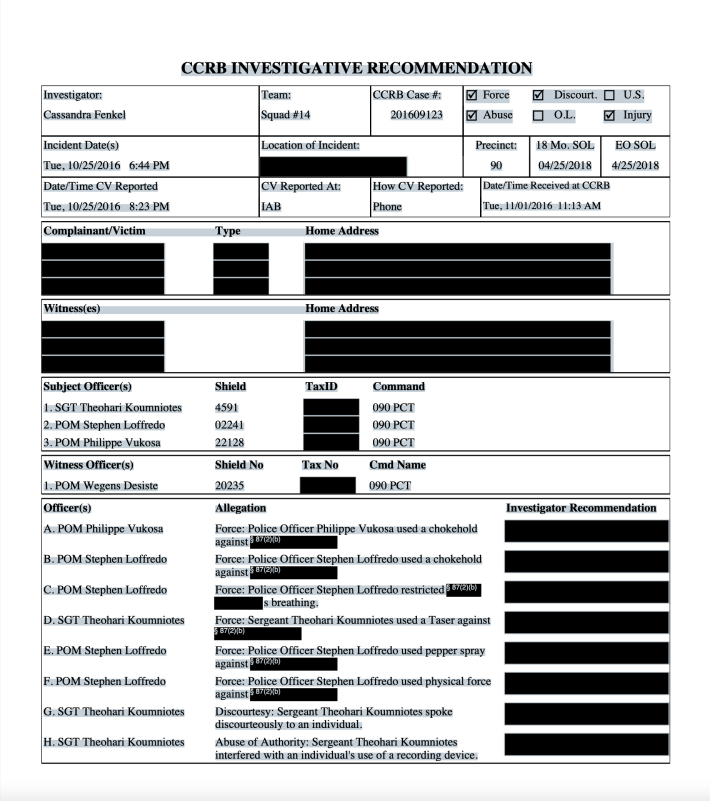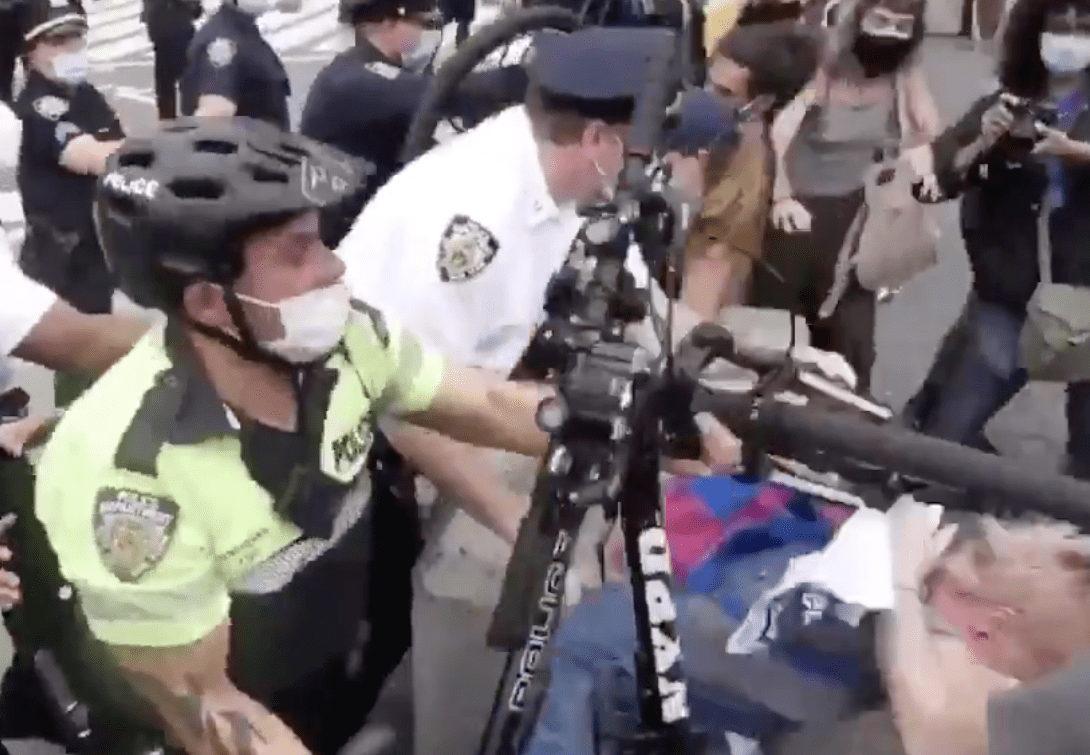On Oct. 15, 2016, four police officers tased and pepper sprayed a man in Williamsburg. One of the officers admitted to using an illegal chokehold, and another yelled a threat at a nearby crowd that formed. For this misconduct, the officers were given wrist slaps.
I know this because in a victory for many different kinds of researchers I recently used the Freedom of Information Law to get so-called "closing reports" on police misconduct prepared by the Civilian Complaint Review Board, the agency in charge of NYPD oversight.
In 2020, 3,872 police misconduct complaints were filed with the CCRB. All will eventually end with the drafting of a closing report. Such reports are gold for anyone who cares about understanding all manner of police misconduct — not just violence, but also illegal searches, racist insults, and more — and how the city investigates it. For every incident reported to CCRB, there is a report, and for substantiated allegations, often a lengthy one. The reports redact the investigator’s ultimate recommendations, but they contain officer names and incident dates, which can be matched against public misconduct databases to see ultimate outcomes.
There are countless ways to use these reports. Cyclists know the NYPD regularly harasses and threatens them. Well, if any of those incidents resulted in a CCRB complaint, FOIL the report using the incident date and location. See what the cops told the CCRB about the incident. Were they honest? Did the CCRB take the time to investigate, or just close the case after leaving a voicemail? Cyclists suing the NYPD, journalists, activists — everyone who wants to shine a spotlight on police abuse will find these documents enlightening.
How I got the city to release these documents — which the CCRB had refused to disclose to the public since its inception in 1953 — is quite a saga. I knew about such reports because, fresh out of college in 2006, I got a job as a CCRB investigator. At 22, I was excited that my first job was to bring corrupt officers to justice. Of course, it didn’t turn out quite like that: By my second year, I felt that too much whitewashing was happening; after what I thought was an especially egregious case, I left.
Later, I went to law school, and eventually became a family lawyer. Then, in July of 2014, Officer Daniel Pantaleo killed Eric Garner, and I watched as the gears of police accountability failed to hold him accountable. Pantaleo wasn’t fired until 2019, a terrible insult to the Garner family, and a brutal indictment of our city’s oversight mechanisms. Because of my bar license and my background, I also felt a responsibility to do something to strike back, as I saw other lawyers doing bravely and effectively.
I wrote some articles and got involved in some activism. After George Floyd’s murder, I read some accounts of police violence against Black Lives Matter protesters. I remembered the lengthy reports CCRB had made me write years ago — with victim and witness statements and interviews with police officers, analysis of evidence, a diary of my investigation. Meanwhile, the so-called 50A law — which kept police disciplinary records secret — had been repealed. There was no longer any legal basis for the city to withhold those reports. Could I get them?
I filed FOIL requests with the CCRB for all closing reports containing allegations against the officers I had read about. I wanted my request to be as specific as possible – less reason for a procedural brush-off. That said, I knew they would be denied. I had spoken with reporters who had tried for the same documents and been turned down, even post-50A. But, I thought, let’s let it play out.
As expected, after multiple extensions, the CCRB denied my requests. I filed an appeal — also denied. I faced a choice: Do I sue?
I’m a family lawyer: I do divorces; I don’t dislodge documents. So I consulted noted civil-rights attorney Gideon Oliver. He thought I had a case, but advised me to tread cautiously. A bad decision, he warned, would make it harder for other lawyers to make the same case. Oliver also gave me a tip: Attach closing reports to your petition. Let the judge see them. In most FOIL litigation, the government doesn’t need to produce the documents for the judge’s review, and the court relies on the summary provided by the same agency trying to keep the documents secret.
The problem was, the CCRB kept closing reports under lock and key. Fortunately, a group of former CCRBers now advocates for reform, and we all keep in touch and support and follow each other’s work. I contacted everyone I could think of who might have a completed report. Nothing at first. But then, someone came through: “Oh yeah I have tons. How many do you need?"

With that ammo, I filed an Article 78 lawsuit — named after a provision in the state’s Freedom of Information Law that enables judges to compel government entities that wrongfully withhold information. We were assigned an October 2021 court date, which we adjourned for November. Then, just before our appearance, I got an email with a zipped file from the NYC Law Department. To my amazement, it contained the closing reports I had requested.
I had won. Without a shot, the city had relented.
I spoke with the city lawyer later that day, who said, “After a lot of discussion, we believe these documents should be made public.” I have to say, I didn’t see it coming. Would the city have lost in court? Probably. But the Law Department regularly fights cases it will eventually lose, sometimes for years, and given how long it had kept these documents secret, I assumed its attorneys would push back hard. But instead, the city gave up. I thanked the lawyer and reminded her that we needed to settle my fees. (FOIL lawsuit winners may be entitled to legal fees if they win.) She agreed. I still haven’t gotten my check, but other than that, the proceeding was an unqualified success.
So how can you get these reports? It’s easy. Log on to the city’s FOIL portal and click “Request a record.” For the category, choose “Public Safety,” and for the agency, choose CCRB. Now describe what you want as specifically as possible. For example, “all closing reports prepared for an incident of alleged misconduct that occurred on Ja. 1, 2019, in the 70th Precinct,” or “all closing reports containing an allegation against Officer John Smith, currently of the 70th Precinct.” Enter your contact information, and voila – you’ve now made a legally proper FOIL request. CCRB may drag its feet in getting you the document, and I would never put it past the city to play games, but you should receive the reports requested in a few months. Remember, you don’t have to be the one who reported the incident — any report is a public document for any interested party.
Our police discipline system is broken. Politicians — including our incoming mayor — minimize or outright dismiss claims that officers are habitually violent, that they break laws and rules with impunity. But now a precedent has been set: The city releases CCRB closing reports. We can prove them wrong using the city’s own records. Let’s do it.
John Teufel (@JohnTeufelNYC) is a freelance writer and lawyer in private practice.







